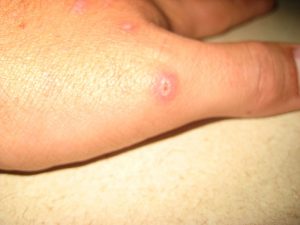Richard S. Vetter is a retired entomologist formerly part of the staff at the University of California, Riverside and he says that spiders are “scapegoated” as the cause of bacterial infections in humans.

According to a study, which is addressed in a Letter to the Editor in the journal Toxicon, says the evidence for spider-vectored infection is scanty.
“Although spider bite may be an attractive and tenable causative agent of a bacterial infection, the data show this is highly improbable,” said Richard S. Vetter, the lead author of the study and a former staff research associate in the UC Riverside Department of Entomology, now retired.
“Any implied causative association between skin infections and spider bites should be considered suspect. The medical community should not scapegoat spiders for bacterial infections. When examining reports of thousands of spider bites of many species worldwide, we found almost no mention of infection associated with the arachnid-inflicted injury.”
“‘Spider bite’ is used as a default diagnosis despite lack of supporting evidence,” he said. “In a study published three years ago, of 182 Southern Californian patients presenting with complaint of spider bite, less than 4 percent had spider envenomations, while about 86 percent had skin infections.”
Vetter’s advice to people concerned with skin infections is that both the medical community and the general public should stop blaming spiders as the cause of bacterial infections.
“This medical platitude is not supported by the history of spider bite data and could lead to misdiagnosed patients who then have an overzealous reaction that could, in turn, lead to the unwarranted development of arachnophobia in bite victims, possibly then requiring psychological desensitization to spiders or excessive use of pesticides in living spaces,” he said.


One thought on “‘Stop blaming spiders for bacterial infections’ says UCR researcher”